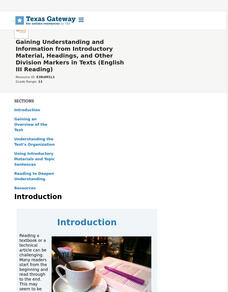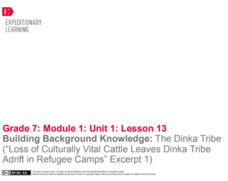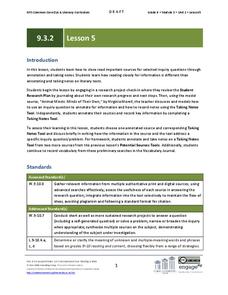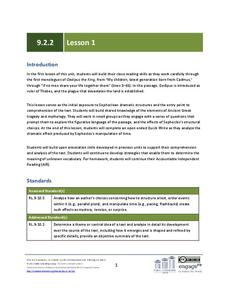K20 Learn
Annotating a Text: Style and Syntax
New ReviewIf you have a favorite author, you probably recognize their style. Conduct a close read of the text, marking it up as they go. Collaborative sharing time and a summary writing prompt follow the main activity.
Texas Education Agency (TEA)
Gaining Understanding and Information from Introductory Material, Headings, and Other Division Markers in Texts (English III Reading)
All teachers are teachers of reading! The 13-part interactive series ends with a lesson that teaches learners (and their instructors) how to approach reading their textbooks. After learning about several strategies, users test their...
Texas Education Agency (TEA)
Annotating to Deepen Understanding (English III Reading)
An interactive resource teaches readers how to annotate all kinds of texts. After reading an introduction that stresses the benefits of text annotations, users examine several models and then demonstrate what they have learned by...
Texas Education Agency (TEA)
Annotate and Analyze a Paired Passage: Practice 1 (English II Reading)
What do a colt and a boy in a tree have in common? More than might be first apparent. The fourth interactive in a series of ten introduces readers to intertextuality, the process of using abstract thinking to consider how one text...
K20 LEARN
Writing An Argumentative Paragraph: Argumentative Writing
Learning how to craft a cogent argument based on a solid claim, supported with evidence and solid reasoning, is an important life skill. Teach middle schoolers about argumentative writing with a lesson asking them to analyze the claims,...
K20 LEARN
Considering "Charles": Pictograms, Annotations, Reading Strategies, And Multimodal Responses
Shirley Jackson's short story, "Charles," provides middle schoolers with an opportunity to practice their close reading skills. Using the provided list of prompts, scholars read and reread the story, then create a multimodal response to...
EngageNY
Building Background Knowledge: The Dinka Tribe (“Loss of Culturally Vital Cattle Leaves Dinka Tribe Adrift in Refugee Camps” Excerpt 1)
Text annotations help readers track essential ideas. Pupils continue reading and annotating an informational article about Sudanese tribes, connecting it with A Long Walk to Water by Linda Sue Park. They also begin writing about their...
EngageNY
Building Background Knowledge: The Dinka and Nuer Tribes Until the Mid-1980s (“Sudanese Tribes Confront Modern War” Excerpt 1) (Version 1)
Readers consider comparisons between the Dinka and Nuer tribes in South Sudan, making connections between an informational article about Sudanese tribes and the novel A Long Walk to Water by Linda Sue Park. They annotate the text to help...
EngageNY
Building Background Knowledge: The Lost Boys of Sudan
Get deep! Teach scholars how to make connections between texts to deepen their understanding of a topic. Using the resource, pupils read and annotate a short informational text about Sudan's Civil War and refugee crisis. Next, they...
Literacy Design Collaborative
Comparing Excerpts from "Atlanta Compromise" and "The Souls of Black Folk"
Scholars analyze two excerpts and compare and contrast the author's points of view. Readers then annotate and determine how word choice supports the points of view. To finish, they participate in accountable talk and transition their...
Newsela
Mexico: Art, Food and Culture
What can we pick up from the culture of others? Scholars learn much about people of Mexico by completing a close reading of articles about the country's culture. After completing the selection, readers carry out tasks, complete quizzes,...
College Board
Reading—Central Idea and Evidence
Young readers become experts at finding the central idea in informational text with an educational resource. The resource includes helpful tips to annotating close passages to succeed on the actual SAT exam, as well as strategies to make...
What So Proudly We Hail
A Lesson on Benjamin Franklin’s “Project for Moral Perfection”
Benjamin Franklin identified 13 virtues that he felt would strengthen his character if he could focus on each one. A thorough lesson explores high schoolers' personal values in the context of their lives, and compels them to strive for...
EngageNY
Grade 9 ELA Module 3, Unit 2, Lesson 9
Part of being a strong researcher is knowing if you're headed in the right direction. Class members study their research frames formulated in the previous lessons of the unit and decide what parts of their inquiry paths need revision or...
EngageNY
Grade 9 ELA Module 3, Unit 2, Lesson 7
Now that learners have honed their inquiry-based projects down to their strongest few questions, they can conduct independent research. High schoolers pursue answers to their inquiries while assessing sources, establishing a research...
EngageNY
Grade 9 ELA Module 3, Unit 2, Lesson 5
Once you find and evaluate your sources, it's time to discern the most helpful information. In a research lesson plan based on questions derived from Temple Grandin's Animals in Translation, practice annotation and taking notes.
EngageNY
Grade 9 ELA Module 2, Unit 2, Lesson 1
Delve into the heart of dramatic dialogue with a unit focused on Oedipus the King by Sophocles. Having completed an online exploration about ancient Greece beforehand, ninth graders read the play's opening lines and analyze how...
Digital Education Resource Archive
Narrative Writing Unit
Each one of the learners in your class has a story to tell, so help them learn the most efficient and organized way to tell their tale. A thorough unit on narrative writing addresses the writing process, grammar, story structure,...
Bantam Books
The Tempest: Think-Aloud Annotation
It can be difficult to refer back to a text when analyzing it, so annotation is a great tool for kids to track what they are reading. A thorough and well-organized instructional activity guides learners through the process of annotating...
Vista Murrieta High School
English II Research Paper Packet
If your school requires a senior research paper or if you are considering one for your class, then this resource is for you. The 43-page packet includes everything from a sample letter to parents to requirements, from topic suggestions...
Freeology
Annotations Bookmark
In general, pupils are not allowed to write in school-issued books; however, they can write on a bookmark that you provide! Kids can take notes on the setting, characters, themes, and connections as they read a short story or novel.
Curated OER
Required Annotations and the Dialectical Journal
Does your class annotate to deepen their understanding of a text? Before they jump into Night by Elie Wiesel, have them practice annotating with a short excerpt. Provided here is a guide to annotation and a two-page excerpt on the...
Curated OER
Reading Comprehension: History of the Periodic Table
Although the article that launches this lesson is about the history of the Periodic Table, the objective is reading comprehension. Using the eight-page informational text, learners answer five comprehension questions and craft one essay....
Curated OER
Reading Critically
Develop the techniques needed to analyze and synthesize literature well. No matter what students read, they need to be able to think critically about the material. Give thinkers these tools to effectively ponder and consider the world...

























